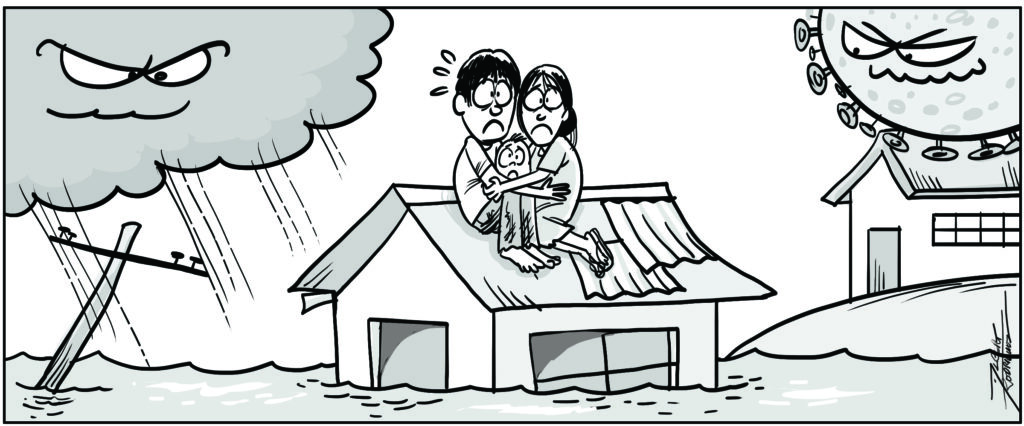In a year of one landmark crisis after another, typhoon season in the Philippines in 2020 bids fair to be as hard and unprecedented. Seven weather disturbances have affected the country in only a month, three of which developed into severe storms with catastrophic results on the population.
“Ulysses,” the latest monster storm, killed at least 14, displaced more than 170,000 people, and caused massive floods that brought back memories of “Ondoy” from 11 years ago. Residents of Marikina, which along with Rizal bore the brunt of the flooding in the metro, said Ulysses is an experience “worse than Ondoy”—because this time they also had to worry about the COVID-19 pandemic that could break out in evacuation centers. As residents escaped chest-deep floods—the Marikina River rose to 22 meters by 11 a.m. on Thursday, breaching the 21.5 meters during Ondoy—an overwhelmed Mayor Marcy Teodoro appealed to the private sector to send rubber boats for rescue operations. “Hindi ito kakayanin ng LGU lang, kailangan na ng tulong ng private sector,” he said.
An average of 20 typhoons hit the Philippines every year; Ulysses is the 21st, and three more are expected by year-end. Experts have been warning that such storms will become more severe due to global warming. President Duterte, referring to Ulysses as a “stark reminder of the urgency [for] collective action to combat the effects of climate change,” has called on developed countries to not turn their backs on the “moral responsibility” to finance and invest in innovative solutions. Abandoning this responsibility, Mr. Duterte said in a speech in last Thursday’s virtual opening of the Asean Summit, would be a “great injustice—a double blow to those who bear the brunt of the adverse consequences of their past actions and inactions.”
Yet, considering that, according to the Global Facility for Disaster Reduction and Recovery, 74 percent of the country’s population is vulnerable to natural disasters, the Duterte administration’s disaster response itself has “remained poor,” the research group Ibon pointed out in January. This year, the government allocated only P16 billion for the National Disaster Risk Reduction and Management Council (NDRRMC), a P4-billion decline from P20 billion in 2019. In 2017, the Duterte administration slashed the NDRRMC’s budget by more than half to P15.8 billion from the P38.9 billion in 2016 under the previous administration. “The administration’s budget priorities disregard the country’s longstanding vulnerability to disasters,” Ibon said, noting how intelligence funds for the police, the military, and the President’s office had instead been increased.
The Department of Budget and Management had to top up the NDRRMC’s budget this year by P5 billion due to its already depleted funds, according to executive director Ricardo Jalad. But most of the extra funds would go to the agency’s COVID-19 response, and the remainder to rehabilitation efforts in areas devastated by Tropical Storm “Quinta” and Supertyphoon “Rolly.” Jalad said they have asked for P20-billion funding for next year, which is only P1 billion more than what the National Task Force to End Local Communist Armed Conflict is asking.
The persistent failure of the government to provide long-term solutions to help mitigate disasters and protect the country’s most vulnerable sectors and climate refugees couldn’t have been more evident than last Monday, as residents of Bato, Catanduanes, prepared for Ulysses even as they were still repairing homes and recovering from Rolly, which had flattened the island early this month. “Pagod na pagod na talaga… magaayos tapos maghahanda… may bagyo na naman daw. Mageempake na naman kung saan kami lilipat,” a tearful resident told ABS-CBN.
As Ulysses battered most of Luzon on Thursday, social media was swamped with appeals for help. Rescue operations are still continuing as of yesterday morning. The country is facing immense, extraordinary emergencies on multiple fronts, from COVID-19 to a record economic slump that has seen millions lose their jobs. But there is simply no room for “donor fatigue” at this hour of great need; every bit of assistance from everyone will count.
Let us help through these donation drives: University of the Philippines (GCash/PayMaya 09278692946; NowheretogobutUP Foundation Inc: BPI Account No. 0993-0113-39); ABS-CBN Sagip Kapamilya (ABS-CBN Lingkod Kapamilya Foundation Inc.: BDO 0039302-14711; BPI 4221-0000-27); Caritas Manila Inc. (BDO 000-5600-45905; Metrobank 175-3-17506954-3; BPI 3063-5357-01; RCBC 000-300-090-2216); and the Philippine Daily Inquirer’s own relief drive (Inquirer Foundation Corp., BDO current account 007960018860, email foundation@inquirer.com.ph).

